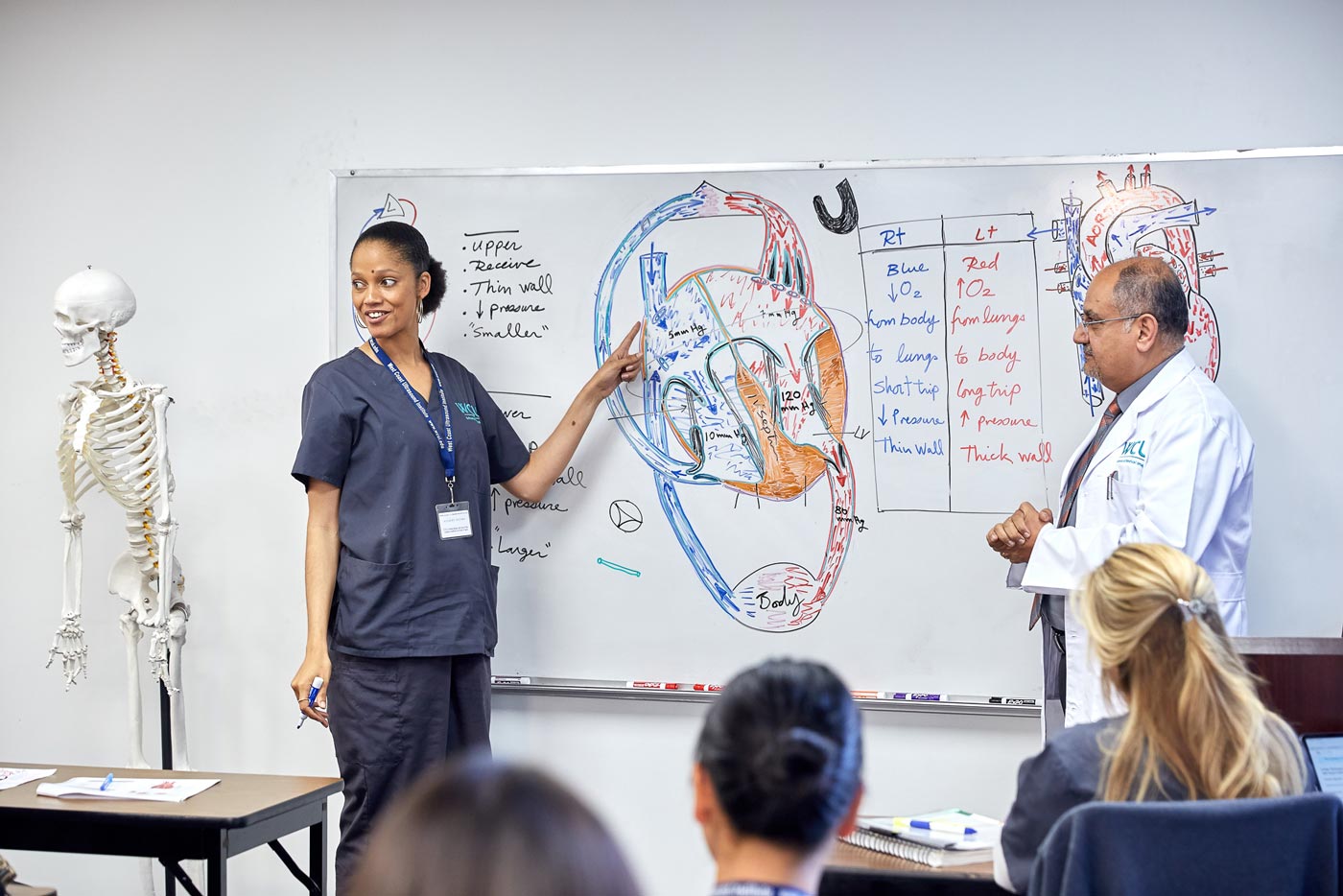INTERESTED IN LEARNING MORE?
REQUEST INFOINTERESTED IN LEARNING MORE?
REQUEST INFONothing in our bodies works without the heart, which makes taking care of it a vital part of our long-term health. According to the American Heart Association, cardiovascular disease contributed to over 800,000 deaths in the U.S. in 2017. And with our country’s population aging, we’ll need skilled medical professionals to help us assess and diagnose heart conditions even more than ever. With the Bachelor of Science degree in Diagnostic Cardiovascular Sonography (Echo), you can set yourself up for an essential career in preventative medicine.
Diagnostic cardiovascular sonography — sometimes also called echocardiography — is a specialized area of medical sonography. All sonographers work in the diagnostic field, operating imaging equipment that uses high-frequency sound waves to take images of patients’ internal organs and tissues. These sonograms (or ultrasounds) are a non-invasive way for medical professionals to figure out what is going on inside a patient. Cardiac sonographers or echocardiographers specialize in using this imaging technology on the heart and cardiovascular system, including the blood vessels, to detect heart complications or even life-threatening cardiac abnormalities. It’s a profession that can often save patients by helping diagnose issues early, including some cardiac sonographers who work to identify congenital anomalies during pregnancy. It’s the kind of profession that truly makes a difference in patients’ lives.
Echocardiographers and sonographers have a wide range of responsibilities and tasks to perform, and some of it varies depending on their work environment. They have to do things like:
Becoming an echocardiographer requires formal education, generally through an accredited degree program. At WCUI, our Diagnostic Cardiovascular Sonography Bachelor of Science degree program will prepare you for an entry-level career in this field, including readying you for any relevant registries or certification exams upon graduation. A bachelor’s degree in echocardiography, in particular, can give you advantages on your career path, including:
On top of that, someone interested in becoming a cardiovascular sonographer should be detail-oriented, good at maintaining a calm and professional demeanor, have great hand-eye coordination, and possess strong critical-thinking and problem-solving skills.
Cardiovascular sonographers can become registered by taking and passing the following registry certification exams. WCUI strongly recommends obtaining certifications to provide you with the best knowledge and opportunities when entering the sonography field. WCUI provides registry reviews and assistance with the registry exam process. See our Pathways to Registry for information on which exam fees are included in the WCUI program cost.
WCUI educates the next generations of sonographers using a combination of online and classroom lectures, in-person hands-on lab experiences, and a capstone 6-month externship. In our Bachelor of Science degree program in Diagnostic Cardiovascular Sonography program, students will be taught:
Our mission and values at WCUI are about promoting the academic excellence and integrity of our graduates in a way that is supportive and contributes positively to our students’ lives. We are here for you, to get you the healthcare education you need for success.
Our echocardiography bachelor’s degree includes both foundational general education courses — like algebra and physics — and in-depth medical coursework like:
Heart and vascular diseases are among the top causes of death in the United States and have topped that list for a while now. The increased prevalence of diabetes, obesity, and our aging population means that the number of people susceptible to heart disease is only expected to rise. All of which would explain why the Bureau of Labor Statistics expects jobs for sonographers to grow much faster than average — 19% through 2030.
*State of California EDD https://www.labormarketinfo.edd.ca.gov/data/employment-projections.html “Projected growth” represents the estimated change in total employment over the projections period (2018-2028).
**Arizona Commerce Authority https://www.azcommerce.com/oeo/labor-market/employment-projections/ “Projected growth” represents the estimated change in total employment over the projections period (2020-2030)

Echocardiographers and cardiovascular sonographers can find work in a wide range of medical facilities all across the country. The majority of them are employed in hospital settings, like:
But just under half are employed outside of those settings, in medical facilities and organizations that include:
WCUI offers a bachelor’s degree program that you can complete in as few as 36 months. Graduates are immediately eligible for relevant CCI and ARDMS registries.
In response to COVID-19, WCUI has moved to a hybrid educational model so your education doesn’t miss a beat. Our program combines online lecture classes with in-person ultrasound labs and 6-months of externship at a hospital or clinical site.
WCUI was founded by well-respected medical professionals, and we’ve been using our experience and knowledge to help our students begin successful careers for over 20 years. We’ve been accredited by the Accrediting Commission of Career Schools and College as a private post-secondary vocational school since 2001.
Are you ready to advance your education? Find the information you need to apply to the WCUI School of Medical Imaging on our Admissions Page or contact our admissions team today.
What do cardiovascular sonographers do?
What is it like as a cardiovascular sonographer?
Cardiovascular Sonographers should be:
Demand and Growth for Cardiovascular Sonographers
Employment rate is based on the cohort of students starting between 10/2015 and 9/2016 at our Los Angeles and Phoenix campus. Individual campus rates can be found in our full 2021 ACCSC Annual Report: www.wcui.edu/consumer-information/
Sources: *State of California EDD https://www.labormarketinfo.edd.ca.gov/data/employment-projections.html “Projected growth” represents the estimated change in total employment over the projections period (2018-2028).
**Arizona Commerce Authority https://www.azcommerce.com/oeo/labor-market/employment-projections/ “Projected growth” represents the estimated change in total employment over the projections period (2020-2030)
Why Should I Consider a Bachelor’s Degree in Cardiovascular Sonography?
Where do Cardiac Sonographers work?
Cardiovascular Sonographers Perform Exams:
Cardiovascular Registry Certification
ENROLLING NOW! Now enrolling for Spring Term starting April 1